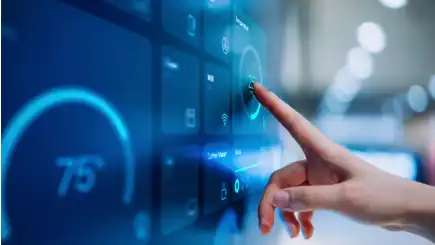Learn internet of things (IoT) with online courses
What is the internet of things (IoT)?
The internet of things lies at the intersection of the physical and digital world. Across industries, it encompasses an extensive network of web-connected devices that use embedded systems like sensors and processors to collect, analyze, and act on data from various environments. Through their connection to the internet, each device can communicate over a network without needing human intervention, which can come in handy for many different tasks.
For example, a fitness tracker can collect data like heart rate or distance walked and communicate it to an IoT application via the internet. Using artificial intelligence (AI) or machine learning, the IoT application analyzes the data to deliver optimal, tailored health recommendations, which the application then communicates back to the fitness tracker. The graphical user interface, such as a mobile application or website, is the third puzzle piece, enabling a user to register, manage, and control the IoT device.Footnote 1
Today, ioT devices can be found throughout our homes and in our workplaces. Many organizations turn to IoT for help increasing efficiency and sustainability, saving money, improving customer service, and raising their overall productivity and value.Footnote 2 For example, industrial IoT, the application of IoT technology in industrial settings, helps companies manage and track supply chains more effectively and conduct preventive and predictive maintenance — ultimately increasing efficiency and lowering costs.Footnote 3
Browse online IoT courses
Stand out in your field
Use the knowledge and skills you have gained to drive impact at work and grow your career.Learn at your own pace
On your computer, tablet or phone, online courses make learning flexible to fit your busy life.Earn a valuable credential
Showcase your key skills and valuable knowledge.
Internet of things course curriculum
Understanding the internet of things can provide a foundation for work in a technical industry — such as cybersecurity, programming, or cloud engineering — or in the IT departments of companies benefiting from IoT applications, like those in the healthcare, manufacturing, agriculture, finance, and hospitality industries.Footnote 4 Internet of things course curricula vary based on whether you’re an IoT beginner, or pursuing a more advanced certification or degree.
An introductory IoT course can contextualize the topic and help learners understand the important role IoT plays in today’s world. Along with teaching practical IoT applications — like how the technology can assist businesses with monitoring, automation, or saving energy — a beginner course may cover what constitutes an IoT design solution, and may examine IoT technology. Learners may also brainstorm IoT ideas that can be implemented in their respective industries.
Learners with more technological experience might pursue IoT courses that take a deep dive into sensors, networks, and protocols. And, an IoT course geared toward data analysis professionals may cover data management, machine learning, and cloud computing applications.
Explore how online learning can help you build the foundational knowledge for careers in fields related to this topic. edX offers a variety of educational opportunities that range from specialized boot camps, to full bachelor’s degree programs and master’s degree programs.
Explore IoT jobs
The advancement of technology has led to a proliferation of IoT solutions, and more and more industries are beginning to rely on the internet of things to power their operations and services.Footnote 5 With the help of IoT devices, building managers can automate maintenance and utility usage, restaurants can use smart ordering systems to track supply, and hospital staff can locate important patient-assistance assets like wheelchairs.
If the chance to solve problems and find new uses for artificial intelligence excites you, consider a career that uses IoT skills. Potential jobs include:Footnote 6
IoT developer
IoT infrastructure architect
IoT solutions engineer
Iot systems administrator
Iot embedded systems designer
How to become an IoT developer online
Depending on the specific role, an IoT career can require a combination of knowledge related to programming, networking, hardware, security, design, and data analysis.
An individual internet of things online course can cover a specialized topic like IoT system design or IoT networks and protocols. Aspiring developers may also be able to build specific skills through coding boot camps or related topics. And an online bachelor’s in computer science or a master’s in data science may be another pathway for learners to develop and practice some of the skills they will need to apply in order to be successful in this field. The right learning path for you will vary depending on your experience, prior knowledge, and desired outcome.

